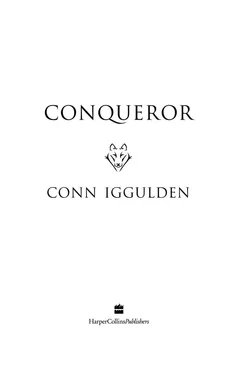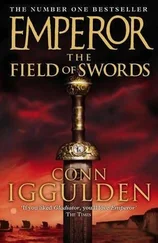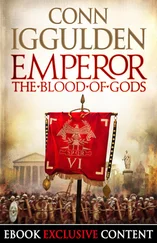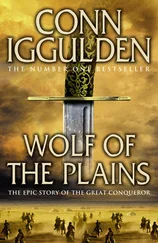Two of Arik-Boke’s tumans had swung out from the battle to reach a good position. As Kublai watched, they drove back in, sending arrows before them, then shoving the bows into the saddle hooks and drawing swords. They believed Kublai was already dead and it gave them heart to keep fighting. He grimaced to himself, then nodded, turning to his bondsmen.
‘Raise them up,’ he shouted. ‘Let them see how we fooled them.’
They grinned wildly as they unrolled great yellow streamers, sliding metal rings over the tips of banner-poles with practised efficiency. With a nod to each other, six of them raised the poles at the same time, sending Kublai’s banners fluttering in the wind.
His tumans raised their swords and bows as they saw it, roaring at the top of their lungs. The crash of sound seemed to send Arik-Boke’s tumans reeling back, but the reality was that Kublai’s men surged forward. Nothing pleased the Mongols more than a good trick on the field of battle. Not only was Kublai alive, but Arik-Boke had wasted the lives of many thousands to tear down a false position. For a short time, Kublai’s warriors laughed as they bent their bows and struck with swords, then the momentary giddiness dissolved and they were back to the grim-faced killing men of the tumans.
Over thousands of heads, Kublai could see his brother’s banners, half a mile distant. He had ignored the position, with no desire to see his brother dead. He wanted him alive if possible, though if the sky father took him with a shaft or a blow, he would not regret the loss. His own bondsmen pressed close around him as those of Arik-Boke’s archers in range sent looping shots high, hoping for a lucky strike. Kublai set his jaw as the air above him filled with whining shafts. He wished for a shield then, but he had not been able to carry one and maintain the deception. One of his bannermen was plucked away with a grunt and another man caught the falling banner as it was jolted out of his hand. Kublai made a growling sound as he saw he would have to pull back. The charge against the exposed flank had carried his rank deep into the enemy and he was exposed to the counter-attack that would surely come now his brother realised his true position.
For a frozen instant of time, Kublai searched the horizon for some sign of Bayar’s tumans. His men had fought well and his officers had shown themselves as an elite. Perhaps four of his brother’s tumans had been slaughtered for the loss of half that number, but the battle was far from over and Kublai was in desperate danger.
Even as he formed the thought, Uriang-Khadai brought tumans across him, forcing the enemy back and allowing him time to get clear.
Kublai shouted to his men to find him a position out of the front ranks and they began to drift through the warriors. They cheered him as he went, still delighted at the deception that had allowed them to humiliate Arik-Boke. Men he knew from years among the Sung raised their swords in salute as he passed them, then pressed on with their tumans.
The battlefield had spread almost a mile from the original site, as the tumans shifted and struck, pulled back and charged again. As Arik-Boke’s men pressed on in rage, Uriang-Khadai pulled four tumans out, leaving a sudden space. The enemy warriors rushed in after them, lost in the need to cut down the jeering horsemen, still hooting and calling to them as they went.
Uriang-Khadai made them run into fresh volleys of arrows from a halted line, emptying quivers by the ten thousand shafts. The broken lines they faced were torn apart, building lines of the dead. Their own archers replied without the massed force of a volley and were quickly cut from their saddles. Uriang-Khadai raised and dropped his arm to signal the shots, then rotated the front ranks to allow those who still had shafts to race forward. In the heart of the battle, the perfection of the manoeuvre broke the centre of Arik-Boke’s forces. Those who survived it pulled back from their mad rush and formed up around their khan, ready to be sent in again.
Kublai had moved back three hundred paces, frustrating the enemy archers who sought him out. From that position, he saw Uriang-Khadai take over and heard the beat of volleys snap once more. He turned his head to see a huge block of fresh warriors detach from his brother’s position and come swinging out. They rode around the wavering centre and Kublai swallowed hard when he saw Uriang-Khadai could be hit from the flank and rear in turn. He looked around for the forces available to him, sending runners to his generals as fast as he could speak and shove them away.
Once again, he looked for Bayar on the horizon. Ever since his return from the Sung, he had dreaded the thought of a battle so closely fought that the armies of the nation destroyed themselves. He had already lost count of the dead, and if it went on, the empire of Genghis would be defenceless, with wolves all around them. He needed the men his warriors were killing. He needed them all. He looked for Bayar and sat frozen, his right hand clenching tight on the sword hilt. Tumans had appeared in the distance, dark lines of racing horsemen.
Kublai felt his initial surge of excitement fade as he saw the number of them. Too many. He breathed harder, feeling fear sink its teeth into him once again. Too many! He had sent only three tumans to Russia with Bayar. The army galloping towards him was far larger.
Kublai closed his eyes and bowed his head, breathing so hard and fast he felt his blood heat soar and his face grow flushed with every beat of his heart. He could surrender, or he could fight to the last man, the worst of all decisions. He wiped blood from his cheek in a spasm of anger, but Arik-Boke’s men were shouting and the formations were moving again, as if to counter a new threat. Kublai’s head jerked up, his breath held in his throat.
Not a reserve, then! Arik-Boke was already shifting his banners around, moving them away under a shield of tumans. Kublai felt dizzy and ill as his pounding pulse dwindled in his ears. He had known the agony of defeat, accepted it. He was not certain what he would have done, even then, but as the men around him shouted and cheered, he bawled with them, waving his sword to the tumans coming in at full speed.
‘Lay down your swords!’ Kublai shouted to the enemy.
His generals took up the cry, then his minghaan officers, then the men who ran each jagun of a hundred. In moments, thousands of voices were yelling the order at Arik-Boke’s men and all the time, six tumans were galloping closer, fresh and deadly with full quivers and unbroken lances. Kublai repeated his order and his tumans repeated it like a chant. Uriang-Khadai pulled them back further, opening a new space between the armies. No one raced to close the gap and the tumans of Arik-Boke sat their mounts in stunned silence, watching sixty thousand men riding hard at them.
Kublai didn’t see the first of Arik-Boke’s men to throw his sword to the ground, followed by the empty quiver from his back. The officer was a senior minghaan and his thousand copied the gesture. Many of them dismounted and stood by their horses, their chests heaving. It spread through Arik-Boke’s tumans, one after the other, beginning with those furthest away from their khan. By the time Kublai could read the banners of Bayar and Batu Khan with him, only a single tuman with Arik-Boke remained armed and ready, surrounded by their own men calling on them to surrender.
Arik-Boke’s last tuman waited in grim silence as Uriang-Khadai gathered his tumans in silent ranks and Bayar and Batu Khan came into range with bows ready.
Under that threat, with a fresh army against them, the last tuman threw down their swords and walked away from the small knot of bannermen with Arik-Boke. He roared at their backs in furious anger, but they ignored him.
Читать дальше
Конец ознакомительного отрывка
Купить книгу











